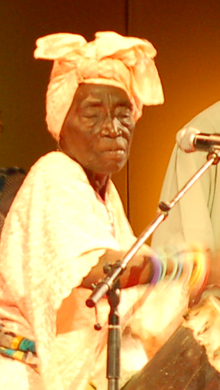BI KIDUDE la grande chanteuse africaine nous a quitté
Paris, le 19 avril 2013
Avec Bi Kidude, disparue à plus de cent ans, c’est une icône de la musique taarab qui s’éteint, et une formidable ambassadrice de la culture de Zanzibar. Son île natale est en deuil de sa chanteuse vénérée, emblème d’une musique envoûtante marquée par le métissage entre monde arabe, africain et océanien.
Voix aux accents déchirants, présence de feu sur scène, Bi Kidude était applaudie dans le monde entier, en particulier en France où les musiques du monde occupent une place importante. C’était un personnage étonnant qui exprimait avec force son indépendance, une femme pleine de tempérament.
J’exprime ma tristesse et mon soutien à mon homologue zanzibari et à ce beau pays, si fertile en talents musicaux.
Bi Kidude
From Wikipedia, the free encyclopedia
Bi Kidude Born Fatuma binti Baraka
c. 1910s
Sultanate of ZanzibarDied 17 April 2013 Nationality Tanzanian Occupation Singer Style Taarab Influenced by Siti binti Saad Religion Islam Awards WOMEX Award
Medal for Arts and SportsFatuma binti Baraka (c.1910s – 17 April 2013),[1][2] aka Bi Kidude, was a Zanzibari-born Tanzanian Taarab singer. She is considered the undisputed queen ofTaarab and Unyago music and was also a protégé of Siti binti Saad.[citation needed] Bi Kidude was born in the village of Mfagimaringo, she was the daughter of a coconut seller in colonial Zanzibar. Bi Kidude’s exact date of birth is unknown, much of her life story is uncorroborated, giving her an almost mythical status.
In 2005 Bi Kidude received the prestigious WOMEX award for her outstanding contribution to music and culture in Zanzibar. She died on 17 April 2013.
Contents
[hide]
[edit]Early life
As a child, she was singled out for her fine voice and, in the 1920s, sang locally with popular cultural troupes, combining an understanding of music with an equally important initiation into traditional medicine. At age 13, after a forced marriage, she fled Zanzibar to mainland Tanzania. Bi Kidude toured mainland East Africa with a taarab ensemble, visiting the major coastal towns and inland as far west as Lake Victoria and Tanganyika. She walked the length and the breadth of the country barefoot in the early 1930s, fleeing another unhappy marriage. In the 1930s, she ended up in Dar es Salaam, where she sang with Egyptian Taarab group for many years. In the 1940s, she returned to Zanzibar, where she acquired a small mud hut to be her home. She is known for her role in the Unyago movement which prepares young Swahili women for their transition through puberty. She was one of the experts of this ancient ritual, performed only to teenage girls, which uses traditional rhythms to teach women to pleasure their husbands, while lecturing against the dangers of sexual abuse and oppression. Moreover Bi Kidude goes down history as one of the greatest music composer characterized by real African tune as featured to African culture, some of commentators considered her to be « the myth » and « the legend ». The very bad lack of her is that, there is no any published book documenting her life apart from the known video documentary « As old as my Toungue-The Myth and Life of Bi Kidude » by director Andy Jones. Some of musical experts call upon the Government of United Republic Of Tanzania to come up with full Biography of this icon.
[edit]Fame within Zanzibar
Her fame has been widely acknowledged throughout the local Zanzibari and Zazibari tourism community, with the luxury hotel on the island, ‘236 Hurumzi’, naming their restaurant ‘Kidude’ in her honour. She was often found residing within the lobby of this hotel in Stonetown.[citation needed]
[edit]Musical works
Bi Kidude has worked with various Taarab groups, but her first solo work is called Zanzibar, it demonstrates Bi Kidude at the peak of her performing power.
[edit]Awards and nominations
[edit]Won
- 2005 WOMEX award
[edit]Awarded
- 2012 President of United Republic of Tanzania awarded Bi Kidude ‘sports and arts award’ of all time
[edit]Nominations
- 2011 Tanzania Music Awards – Best Collaboration & Best Traditional Song (‘Ahmada’ with Offside trick)
[edit]References
[edit]See also
[edit]External links



